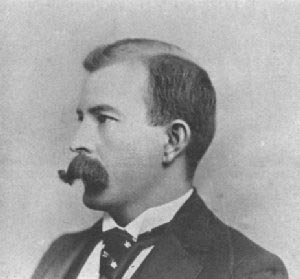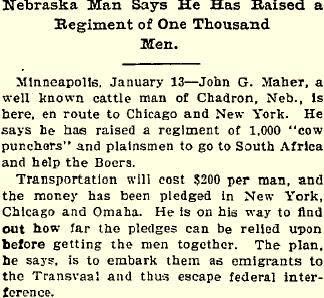Nebraska newspaper readers in late 1899 were keeping abreast of the latest reports from Africa, where the Second Boer War (1899-1902), pitting the British against the descendants of Dutch settlers (Boers), was raging. Although the United States was officially neutral, there was considerable sympathy among some Americans for the small group of independent-minded farmers fighting the British empire, which seemed to parallel our own war for independence. Relief drives to aid the Boers were organized, and some even talked of sending American volunteers to Africa to join the fight against the British.
The Omaha World-Herald on December 31, 1899, announced that such an effort was underway in western Nebraska “to organize a regiment of Nebraskans to go to South Africa in behalf of the Afrikanders.” The World-Herald noted that “somewhat of a sensation” had been created in Chadron by the efforts of John G. Maher and Allen G. Fisher, who “Are Summoning a Host of Nebraskans to Do Battle With Great Britain. Over Eight Hundred Sturdy Sons of Toil Said to Be Enrolled Now for the Purpose.” The World–Herald said:
“A want card was placed in the daily papers of the state. . . . asking for clerks and common laborers.” Applicants for the jobs were then “asked if they wanted to enlist in behalf of the Boers in their struggle for the overthrow of British rule. Those who did immediately let the fact be known to their friends, who wished to apply, and to date over 850 have enrolled their names as volunteers to the pro-Boer regiment in this state.” It was planned to have all those interested go as private citizens to Africa to avoid federal interference and then organize there. The Brooklyn (New York) Daily Eagle reported on January 14, 1900, that Maher was then enroute to Chicago and New York to investigate financing for moving 1,000 “‘cow punchers’ and plainsmen” to South Africa to help the Boers.
Some readers may have wondered if the association of Maher (a well-known hoaxer) with the scheme indicated that it was less than serious. If so, it didn’t prevent others in Nebraska and elsewhere from taking similar action. Chadron’s Dawes County Journal said on January 12 that Porter J. Hand of Nebraska City was forming “a regiment of cowboys” to go to South Africa. “He [Hand] has enlisted a number of men, but is still waiting for some definite instructions. He said today: ‘I believe I could enlist 2,000 men if I had a free hand in this matter. But one has to be exceedingly careful in this thing, for, you know, Uncle Samuel keeps his eye out for all matters of this kind, and I have no desire to get tangled up with the government.” The Wichita [Kansas] Daily Eagle reported on February 22 that J. C. Cantrell of Indian Territory was raising “a regiment of Rough Riders to take part in the South African war on the Boer side. . . . and he has agents in different portions of the Indian territory, Oklahoma and Montana who are engaged in enlisting men for the service.”
While it is true that some American volunteers fought alongside the Boers, it isn’t known if any Nebraskans were among them. Maher, Fisher, and Hand were all Spanish American War veterans, which may have influenced them to consider military help for the Boers. Maher later accompanied troops under Gen. John J. Pershing to the Mexican border in 1916 in pursuit of Pancho Villa, and volunteered again in 1917 for service in World War I. After serving as the American Expeditionary Force’s chief disbursing officer in France, he was honorably discharged in 1919.

John G. Maher. From Addison E. Sheldon, Poems and Sketches of Nebraska (Lincoln, 1908).

From the Brooklyn [New York] Daily Eagle, January 14, 1900



